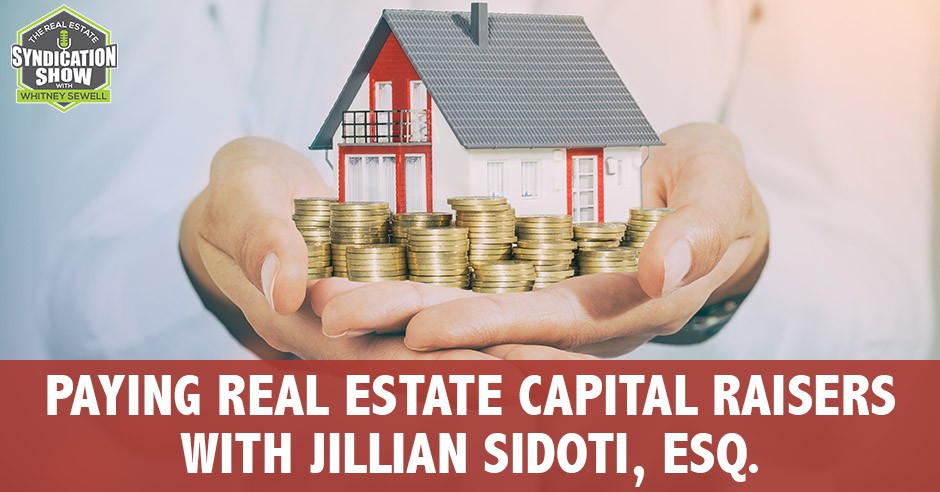Listen to the podcast here:
Everything comes at a cost. That includes hiring capital raisers to help you raise funds. Jillian Sidoti, Esq., one of the country’s leading experts on Regulation A+, has assisted multiple companies and entrepreneurs realize their fundraising goals through Crowdfunding, 506©, and Regulation A. In today’s episode, she goes in-depth on the art of capital raising. Learn the legal aspect of hiring and paying for capital raisers and the regulations of being a broker-dealer. On top of that, get educated to prevent yourself from getting wrapped up in a situation that would cost you more in legal fees than the money you ever made.
—
Watch the episode here:
Listen to the podcast here:
Paying Real Estate Capital Raisers with Jillian Sidoti, Esq.
Our guest is Jillian Sidoti. Thanks for being on the show, Jillian.
Thanks for having me. I appreciate it.
A lot of our audiences have probably heard of Jillian before and you should have because she’s one of the leading syndication attorneys in the country. She’s speaking at many events. She is educating lots of people about the legal ways of doing this business and doing it correctly. On this episode, we are getting into a topic that is so hard right now. She and I were discussing it and she was confirming what I already thought that everybody wants to know about paying people to raise capital. I appreciate our audience being with us. Jillian, give them a little more about your background in case they don’t know who you are and what you’re doing. Let’s get into how we pay capital raisers. What should that look like and maybe some other things that are happening to people who are trying to do that?
I started off in real estate myself before I was practicing law. I never wanted to be a lawyer. I wanted to get into real estate investing when I was in law school. I started off looking for money and for deals that we were doing. We were doing conversions in San Diego back before the last downturn and I would arrange both the debt and equity financing. I do know what it takes or what is required and how hard it is to raise capital. It’s not lost on me on how difficult it can be or it’s difficult from the perspective of law. It’s difficult from the perspective of marketing and things like that. I’m trying to be sensitive to that.
I’m also vicious when it comes to following the law and I’m vicious, not because I am into the law and think the government is awesome. It’s because I don’t want you, the readers who are thinking about syndicating something to get yourself wrapped up in a situation where it costs you more in legal fees than the money you ever made. That to me is the most tragic thing that can happen plus the loss of sleep, the extra wrinkles and gray hairs that you will get if you are indeed investigated by one of these governmental agencies for violating the Securities Law. That’s why I’m vicious about it.
Can you give the audience a little about your business right now? We know you’re a syndication attorney, but maybe a little bit about the type of clients you have and work with. Is that a certain part of the country? Is that anywhere and what you all are up to?
[bctt tweet=”Don’t take investors if you don’t know what they’re doing.” via=”no”]
Our clients vary. I’ll take the first guy doing his first single-family flip and looking to pool a couple of his family members’ money. I’ll take that guy. If they seem like they know what they’re doing and they have good intentions and they’re looking to do it the right way, I’ll be happy to help that person. My biggest client probably right now is a guy named Grant Cardone, who probably a lot of your readers know who he is. He wrote the book The 10X Rule. He’s a big real estate investor. He does class A multifamily buildings, mostly in the Southeast. It varies on the type of client that I have and I like both types of clients. I personally learn from both sides of clients but if somebody is looking to skirt the law or I feel is not that educated on what it is they’re trying to accomplish, I won’t take the client.
It’s not worth the risk for me. It’s not worth worrying about if investors out there being exposed. If you don’t have the education that I believe is required and I’m not the end-all be-all of determining who has the right education. If you’re asking questions that you shouldn’t be asking when raising private capital, I will send you to my website. I’ll send you articles or put you in another direction before we start going out and trying to help you raise capital because it’s not good if you don’t know what you’re doing. As I tell people, “Don’t take investors if you don’t know what they’re doing,” I’m not going to take you as a client if you don’t know what you’re doing.
You mentioned you’re not going to take everyone. You’re going to judge their education in the business to know that they know how to operate at a professional level and legal level before you’re going to take them on so you don’t expose yourself.
It’s not about exposing myself, it’s exposing investors as well. I’m mindful of the guy who believed in you to invest $30,000 or whatever it might be. One of my aunts, my favorite aunt, she asked me a couple of years ago, “Can you help me get into a real estate deal?” I knew she was a super risk averse. I found a deal for her. I got her in that deal. It was somebody I trusted and I knew would take to be a good steward on her money. I always think of my aunt when I’m thinking about when people are going out and raising capital. Would I want my aunt to invest with you? If I think no and I can’t always stop it. Sometimes we get in it to win it and it’s too late. I can only hope and pray for the best and keep my fingers crossed. I’m not the end-all be-all judge. I have been wrong before, but I think about my aunt. Would I want my aunt investing with this person and do I trust that? That’s what it comes down to.
To get into our topic, I know it’s such a hot topic right now. I hear it often. Jillian, you’re an expert on helping us understand this. How do we pay people to raise capital for us? We’re doing a deal. Other people want to partner and bring in their investors. What does that look like, Jillian, so we know that we’re doing it legally if we can do it. I want your opinion and you can help the audience to understand that.
What I’m seeing a lot that is this thing where somebody will say something like, “I’ll pay you a commission for helping me raise capital.” The analogy I always use is that you can’t pay somebody a commission for selling real estate if that person doesn’t have a real estate license. The same goes for securities. A real estate license isn’t going to cut. You need more than a real estate license to sell securities. You need what’s called a securities license. This is all defined in the Securities Exchange Act of 1934. It defined a broker as any person engaged in the business of perfecting transactions in securities for the account of others. It defines a dealer as any person engaged in the business of buying and selling securities, personal accounts through a broker or otherwise.

What you have to do is a security sold in a transaction that is exempt from the Securities Act of 1933. For your audience, you don’t know as an exempt transaction on the Securities Act would be something like under Regulation D. You’ll find those six offerings. We will find B or C or Regulation A offering. Those are exempt transactions. If you’re selling those securities under those exemptions, what the law says, “A person who sells securities that are exempt from registration under Regulation D of the 1933 Act must nevertheless register as a broker-dealer.” In other words, placement agents are not exempt from broker-dealer registration. If you’re going out there and paying people a commission to sell your securities, you better make sure that they are licensed with a Series 7 or Series 22 or something of the like in order to be legally receiving a commission. I see it all the time where people are paying these commissions for people to sell securities or one trick that I love is that we’ll call it something else.
It’s like one of my favorite sayings is, “If you have a dog and you called a tail a leg, how many legs the dog have?” “Four.” Just because you called the tail a leg, it does it make it so. That’s how I feel about it. When somebody said like, “It’s not a commission, it’s a finder’s fee or it’s a performance fee or whatever they call it. If you’re paying somebody based on the capital that they raise, then that is a commission. They’re illegally selling securities if they do not have a license. You got to be careful because the SEC is strangely vicious about this right now. Even if you haven’t done anything wrong, if they catch you without a license, they are going to come after you. Most of the people I find who are in this position are what we consider low-hanging fruits. They don’t have a lot of money to pay a big-time attorney to defend them. It’s easier to pay the fines because they’re going to end up paying the fine anyhow no matter what.
You mentioned securities license and registering as a broker-dealer and some of those things. Who needs that securities licenses? Is that going to be the operator or is it the person that’s raising the capital under them, what does that look like?
I don’t want to get too woozy on people, but it deserves a discussion. For example, under this rule called Rule 3a4-1, it’s called an issuer exemption. If you’re the sponsor, if you’re the guy offering the security and you don’t pay yourself a commission and you’re selling your own securities, etc., then you have an exemption from registration as a broker-dealer. You don’t have to have a license if you’re selling your own securities and you’re not receiving a commission for selling the securities. It’s the person who’s selling the securities and receiving a commission that needs the license. The problem is a lot of times people hear that you can pay a finder’s fee. We can get into that and talk about what a finder’s fee looks like and how much you can pay in terms of a finder’s fee but what it comes down to is that a finder’s fee tied to the amount of capital raised. If it is, it’s commission. If they’re getting paid a commission, that person who’s selling and receiving the commission has to be licensed.
How do I get licensed? Is that even an option or is that something you’ve seen anybody pursue to have a securities license and register as a broker-dealer?
I’ve had a couple of clients in some limited circumstances especially when there’s solicitation around and they want to avoid people who are raising capital. I’ve had a couple of people go and get that license for sure, but most people don’t. The reason why is because going out and getting that license is no easy feat or comfortable feat keep. Brokers are highly regulated. FINRA who is the organization that monitors brokers, they can come into your opposite anytime and look around, see what it’s doing and make sure everything’s on the up and up. A lot of times if you’re raising a small amount of capital, that license is not worth it. You got to find a different way. You can become part of the issuer. There are all kinds of different ways you can do this without risking or taking these unreasonable risks and I assure you, there are unreasonable risks.
[bctt tweet=”Your interests should be aligned with your investors’ interests.” via=”no”]
Let’s talk about that the right way to bring those people on or the right way to do this because I know it’s every reader is probably wondering about this. What is the right way to pursue this as the operator and as somebody who wants to partner with an operator?
If you want to partner with an operator, then you should become part of the operator and take from the backend. Instead of taking a commission on the frontend, you can take equity on the backend and get paid after the investors get paid back so that you are closely tied with the success of the investor, number one. Number two, have an ongoing relationship. A big no, no for the SEC is seeing these people who come in and they sell the security. They take their cash and their CEO wouldn’t want the investor. That’s a huge problem. You have to be in it to win it. You have to be in it to the very end. That’s what you want to do. Your interests should be aligned with your investor.
One thing I’ve seen that I like is a finder or somebody who’s out there capital raising that was a fund of funds. Those are okay if they’re properly put together. I’m invested in a fund of funds. What happens is that our finder, our sponsor found another sponsor, a bigger sponsor and the bigger sponsor was doing this big deal and needed a lot of capital. Our sponsors went to that guy and said, “I’m going to bring in all these investors. Here’s what you’re going to do.” He negotiated a better deal for us, the investors and also said to the top sponsor, “You’re going to pay me a fee for putting this whole thing together.” It wasn’t related to how much money was raised. It was a flat fee. I’m getting this cash. We were told as investors that I’m getting this cash. I’m going to continue to take care of you, my investors. I’m going to be your advocate.
There was more to it than raising capital. There was a sense of advocacy involved. There was no commission. We got a better deal. He did negotiate it for us. He had received a part of a management fee for continuing to take care of us as the investors and to monitor the investment opportunities. That’s one clean, easy way. You have to have the right paperwork as a finder in that case. When I invested in that deal, I didn’t get one private placement memorandum, I got two. I got one from the original sponsor that was an exhibit to the private placement memorandum that I read, which was from my sponsor. That is one clean above board way of doing it where no one’s receiving commission. The sponsors are still getting paid. We’re still getting taken care of, all the laws are being followed and that kind of thing. The fund I invested in was a fund that was investing in another fund.
Can they take that fund and invest in other deals as well now or is this strictly for this one property?
That particular one was for that. It wasn’t for properties for another fund, but that particular one was for that fund. I do represent clients who do that. As a matter of fact, I have a Regulation A right now that I should be submitting any day now to the SEC which is going to basically be a fund of funds where my client keeps getting people coming to him with development deals. Here’s what he’s doing. He wants to get in on all these development deals. The reason why they want to develop their properties themselves is because they have expert developers in the markets where they are that can do all the development. He’s joint venturing with those companies, those developers. He’s going to manage all the investment and the developer will manage all the development. They’ll joint venture together and divide and conquer it that way. My client is going to be in it for the long haul. The investors will know straight upfront, we are not developing the project. We have somebody else we’re joint venturing with. It’s their project. They’re going to develop the project, but we are going to take an equity interest in that deal.

They’re handling all investor relations. That is their part of the deal.
They are getting paid a fee for managing that. They’re not getting a fee for raising capital, they’re getting a fee for ongoing management.
Just to clarify as well because I felt like most of the readers are going to be in the boat of, “I’m trying to get started and you hear most people are getting started raising capital for other people’s deals and to reiterate the proper way. They know if they’re going to an operator that they know that this is done properly or they’re going to be part of the deal. They’re not going to be paid. They know by what they raised, that they’re going to get something on the backend. Are there any other ways that we can reiterate that before we run out of time?
Another thing is if you don’t want to stay in the deal, one other thing you can do is you can take a finder’s fee, but that finder’s fee has to be a mere introduction. You’re not actively selling. You’re saying to the investor, “This guy over here has this deal. If you’re interested, I’ll make an introduction for you.” That’s a mere introduction and then what does that finder get paid? A flat fee. It doesn’t matter how much an investor invests, it’s a flat fee that the finder receives and they can be on their way. I liken this to if you get something in the mail from Verizon and Verizon says, “If you refer a friend to us for cable services, we’ll give you $50 off your bill.” It’s the same thing. You’re not going to call your friend and say, “Would you like to get Verizon services? I’ll come in and sell the cable for you and then you go over and install the cable. You merely give them a little code and they call Verizon themselves. It’s the same concept. If you can employ a concept like that, that would be helpful as well. Again, it’s my least favorite way. I like to see people who if they’re bringing investors in, they’re responsible for those investors.
I’ve seen that done numerous times where if somebody is raising and they’re partnering on a deal. They’re investors and they’re doing all the communications with investors. Those are their investors. Now, we’re treading a little more lightly. Is that what you’re saying?
Yeah. I have a ton of cases here in front of me right now, but this is what I’ll end with. Smith was an insurance and retirement planner who assisted in the sale of notes for an issuer. How many people out there are selling notes on their single-family properties? This is in the sale of notes for an issuer. According to the facts cited in the settled SEC order, which he neither admitted nor denied, Smith identified investors, solicited them in face-to-face meetings and phone calls and emails, advised as to the merits of the investment and handle the mechanics of the investments including funds to the issuer. He received transaction-based compensation in the form of commissions of a percentage of the amounts invested.
[bctt tweet=”If you don’t want to stay in the deal, take a finder’s fee. ” via=”no”]
As a result, Smith received a cease and desist order, various bars from future association, service or participation and he was required to pay full disgorgement of his commissions received plus prejudgment interests. In other words, now this guy has probably paid an attorney to defend him in this action. He received a cease and desist and various bars. He had to pay full disgorgement. Any money he did receive went back to the SEC plus interest on that money. His financial condition rendered him unable to pay a Civil Monetary Penalty. In other words, had he had enough money, he would have also had to pay a Civil Monetary Penalty. This is typical. This is not a special case. Did this guy do anything criminal? He broke the law nonetheless so now he’s subject to having problems with not financial problems and paying the money back, but now he is barred from doing certain things. I don’t know what the bar was. I don’t know how long it was for, but now he can’t appear probably before the SEC. He can’t be licensed as a broker-dealer and not that he wanted to be but that stinks.
Jillian, what has been the number one thing that’s contributed to your success?
I don’t know why, it came to mind first but there’s a book by Dale Carnegie called How To Win Friends & Influence People. The principle of the book, if you’ve never read is about being kind. I try to always use that and I’ll tell you it’s paid off in spades. I don’t ever focus on the fact that I’m a female in a male-dominated industry but that is a fact. It’s never bothered me because no matter how nasty somebody gets with me, I try to fill him with kindness and it’s always worked out for me.
Somebody that’s getting started in this business, I know you talked about you want them to have a certain level of education before they’re going to be able to work with somebody like yourself. What’s the best way you recommend them to you be educated about this business to be able to work with somebody like yourself?
I want to say anybody who calls me, I sounded really harsh. I reject people constantly signing into my website. I’m banishing you because you’re not educated enough. It’s not that. It’s, “I want you to know what you’re doing before you do it.” Let’s get you to know what to do. You can go to our website and you probably see right behind me, I have my partner’s book, Gene Trowbridge’s It’s a Whole New Business. It’s the best book on real estate syndication. It’s how I learned to do real estate syndication. I didn’t know the world of real estate syndication existed before I read that book. I read that book and I have a book back there, The Crowdfunding Myth. I’m updating it now. It’s a little out of date. Some of the rules need to be updated there. Our website, if you don’t want to pay money, that’s okay. Go to our website, CrowdFundingLawyers.net. There are tons of free stuff there. I also run a webinar series called Private Money Rockstar. You could check out PrivateMoneyRockstar.com too.
The webinar’s you all do is very useful. I wish I could be on more of them myself. I learned a lot from you and Gene. I’ve enjoyed getting to know Gene a little bit as well. I’ve got his book on my bookshelf as well. What’s something you’re excited about in the near future for your business or personally?

For the next downturn, which will probably be here in about two years because I’m squirreling away my money. I’m hoarding cash right now because I did not have cash for the last downturn. I did have some cash. I bought some deals. They did very well. I’m grateful for that but I do believe it’s going to happen again. I want to be ready for it. I’m excited about that. I’m excited about the future of being able to take advantage of that. Now, I’m not excited about what it might do for others. That does have me a little twitchy. There’s going to be a lot of opportunity for a new wave of wealth and wealth-generation for a lot of people out there. If you’re mindful, save your pennies or invest them wisely right now so that you have the cash available for the next downturn and you’ll be in good shape.
How do you like to give back?
I’m very charitable. The one thing I love doing for my time element of giving away, every Thursday morning, I go to the local food pantry and I cook breakfast for the volunteers. They have somebody come in and cook every time every morning. We’re only open on Wednesdays and Thursdays. Thursday is my day. I go in, I cook for all the volunteers. I cooked some meal. It’s served at breakfast time but I don’t always serve breakfast. It’s some meal for about 40 people every Thursday. That’s what I do for my time elements of a day. Sometimes I also deliver groceries to the elderly. I am a co-founder of the anti-human trafficking organization called Project Purpose International. We bought a car. We’re super excited about that. It’s as a car in Africa to help pull people off the streets or in situations. Trafficking is a problem as we know everywhere. It’s a massive problem in Africa. We have a woman who runs to center down there for women and children to get them out of trafficking situations. We’re small but mighty. Its biggest benefactor is me.
I’ve learned a little bit about the human trafficking problem and it’s a major problem. Thank you for doing that. How can the audience get in touch with you?
You can email me at [email protected]. I’d love to hear from all of you. Visit our website, as I said before, but also visit us on Facebook because we do a lot of like Facebook Lives, pushing out videos and articles on there as well.
Jillian, you’ve been a great guest. I appreciate you covering this topic that a lot of people try to stay away from. I appreciate you for being willing to dive in and a lot of readers appreciate it as well. I hope you will leave us a rating and review. I hope you’ll go to our Facebook group, The Real Estate Syndication Show and also go to Life Bridge Capital and connect with me. I’m happy to help you in any way I can. We will talk to each of you next time.
Important Links:
- Jillian Sidoti
- The 10X Rule
- FINRA
- How To Win Friends & Influence People
- It’s a Whole New Business
- The Crowdfunding Myth
- CrowdFundingLawyers.net
- PrivateMoneyRockstar.com
- Project Purpose International
- [email protected]
- Facebook – Crowdfunding Lawyers Facebook Page
- The Real Estate Syndication Show – Facebook Group
About Jillian Sidoti, Esq.

Prior to her legal career, Jillian owned and operated a record label enabling her to tour worldwide with artists, including visiting South Africa, Canada, Europe, and the United States. Using that experience, Jillian has been commissioned to write articles and contracts for many music industry entities.
For several years, Jillian taught Finance and Accounting for the BS and MBA programs at the University of Redlands, drawing on her experience as Financial Analyst, Controller, and CFO for many companies from manufacturing to real estate development. Jillian also teaches a Small Business Management class where students are taught the anatomy of a business plan.
Jillian may be contacted at [email protected] or 323-799-1342.
Love the show? Subscribe, rate, review, and share!
Join the Real Estate Syndication Show Community:




